from 0 review
10 days / 9 nights
Daily Tour
28 people
___
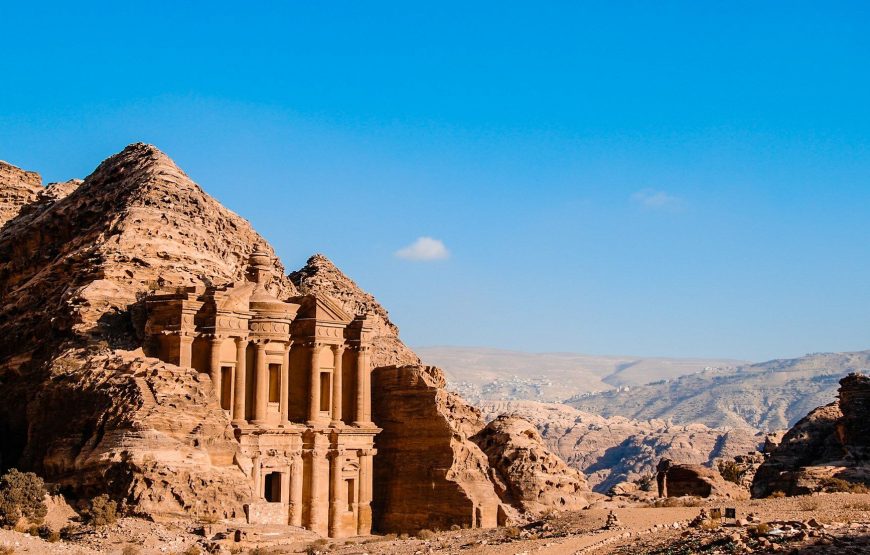
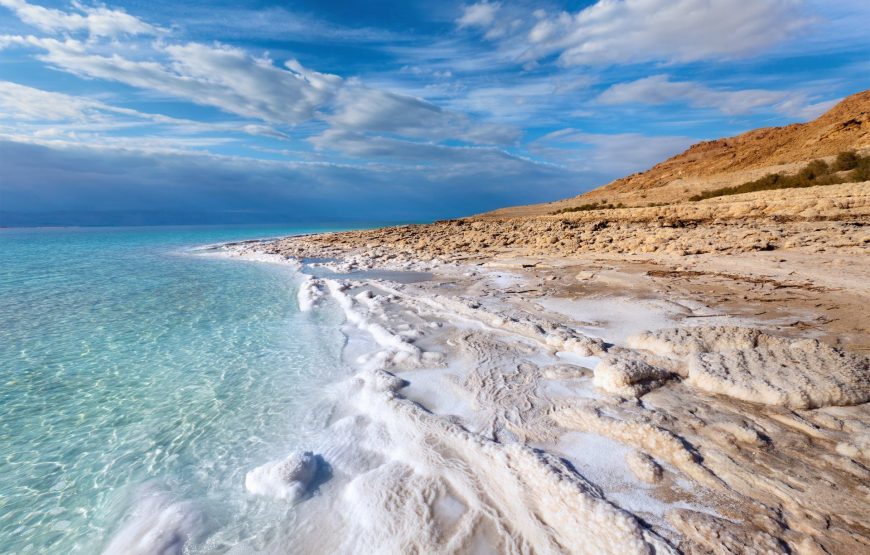
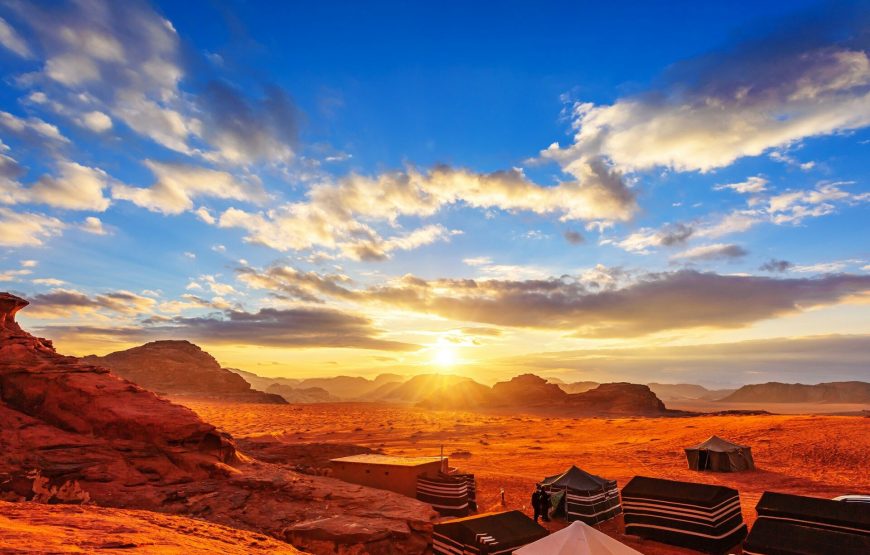
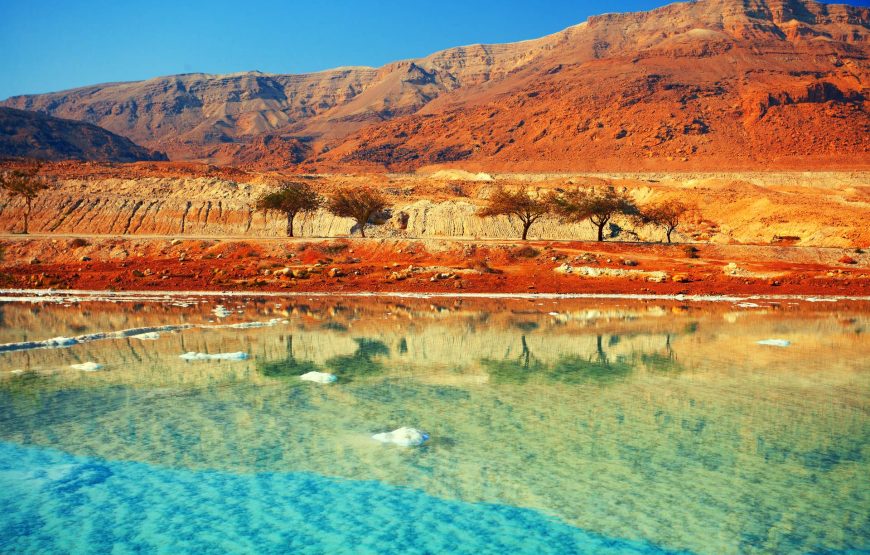
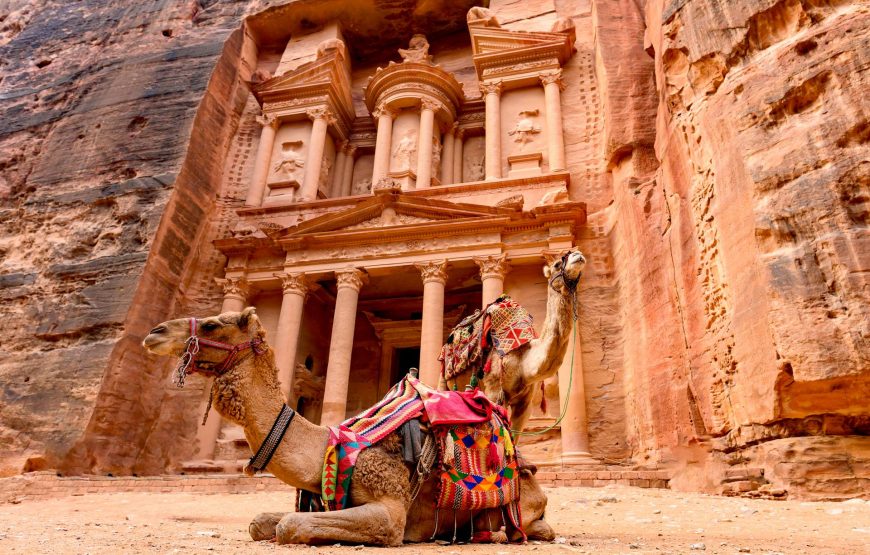
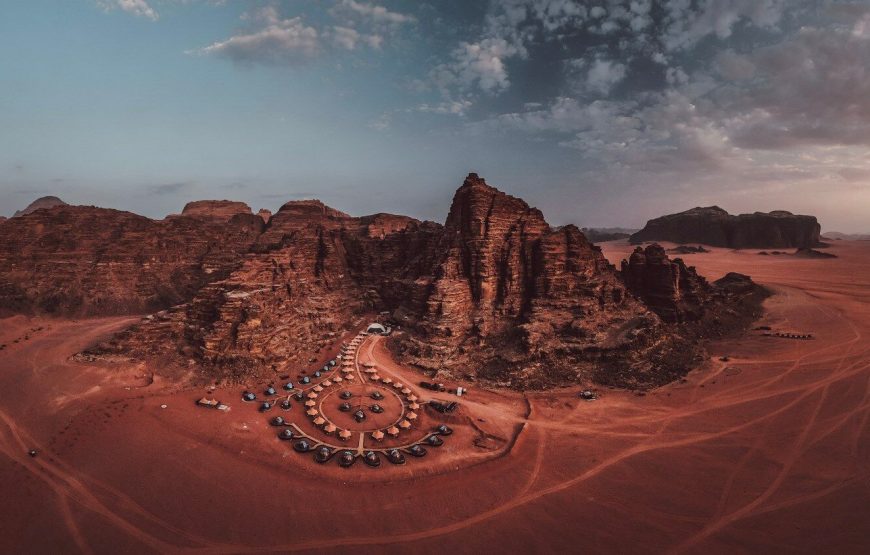
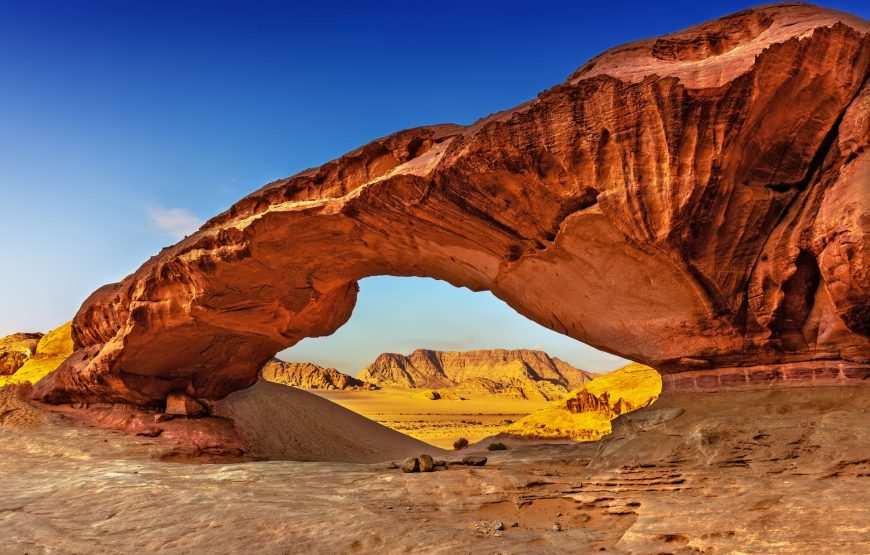
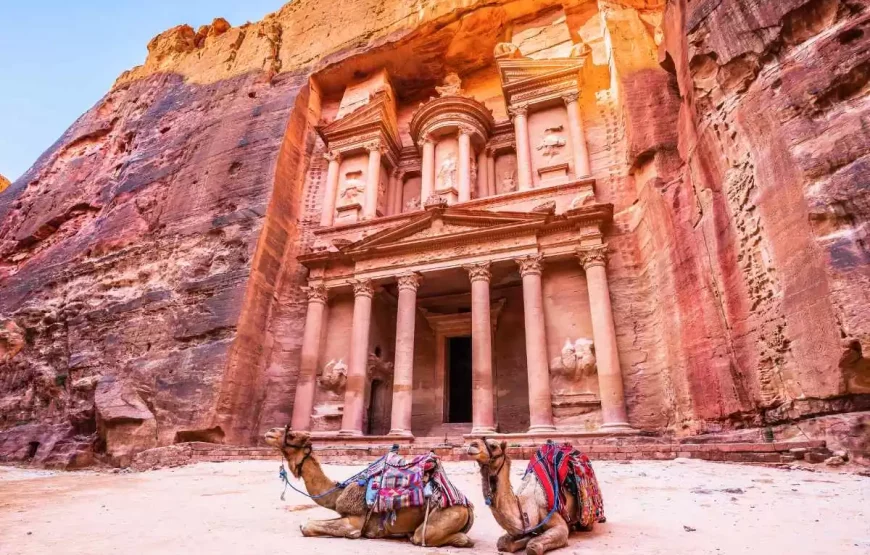
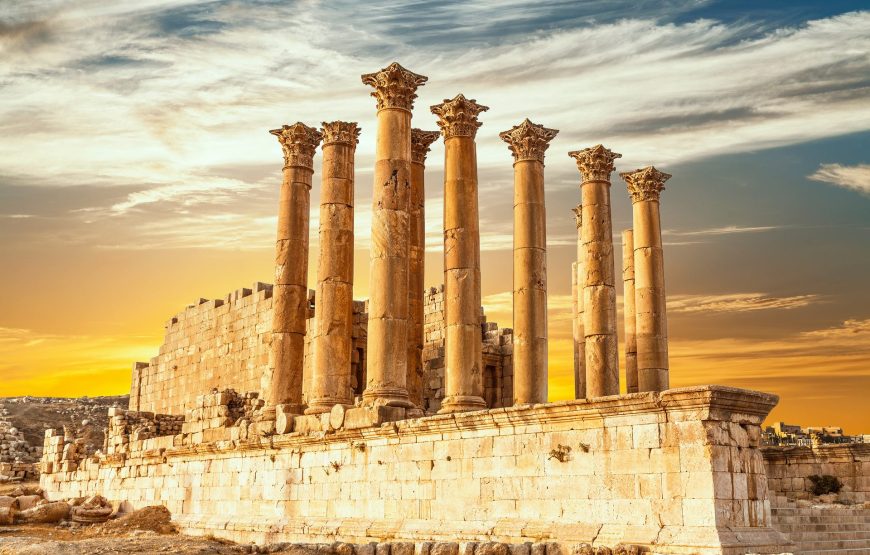
Very complete program with the main sites of the country
1h30 desert getaway in 4×4
A full day in Petra with free time for personal discovery
The experience of a night in the Wadi Rum desert
Two nights at the Dead Sea at the end of the tour.
Flight to Amman. Welcome at Queen Alia International Airport before customs clearance to obtain your visa free of charge with the rest of the group (if passport information provided 21 days before departure). Group transfer to the hotel. Free dinner and overnight stay in Amman. Depending on the selected flight times, arrival possible at night.
Breakfast at the hotel. Departure for the Desert Castles. Lunch included. The first castle visited is Qasr Al-Kharaneh, located 55 km from Amman. It is probably the only one that had a primarily military function, as its architecture suggests. Qasr Amra is located 26 km southwest of Azraq, on the edge of the main road. Qasr Amra occupies an island that was formed in the bed of a Wadi that is almost always dry. This small, well-preserved castle has clear lines and rounded contours, whose blond stone blends into the heat of the desert. Qasr Amra was built at the beginning of the 8th century by Caliph Walid I, a great lover of hunting, poetry and various pleasures. Qasr Al Azraq was severely affected by an earthquake in 1927, but the castle remains magnificent. It is the inscription above the main entrance that allowed us to date the renovation to the 13th century, the probable date of the construction of the mosque in the center of the courtyard. Return to Amman for a visit to the capital of the Hashemite Kingdom. Between the eastern desert and the Jordan Valley, Amman is home to a good million inhabitants. Built entirely in beige-white limestone, the city is an aggregate of cream-colored cubes, gilded by the sun. From the top of the citadel, do not miss the superb view of the lower city. But before going down there, a visit to the Archaeological Museum, the Temple of Hercules and the Umayyad Palace is a must. Then a short tour of the lower city, which has preserved a beautiful Greco-Roman Theater, which can accommodate around six thousand spectators. Return to the hotel. Dinner and overnight at the hotel.
Breakfast at the hotel. Departure to the ancient city of Jerash also called Gerasa about 45km from Amman. It is the second largest site in Jordan after Petra. Today, it is considered one of the best-preserved Roman provincial cities in the Near East. It was hidden under the sand for several centuries before being discovered and restored for 70 years. The city was entirely built in a pinkish-orange limestone, which is magnified at dawn and sunset by the rays of the sun. The peak of Gerasa dates from the 2nd and 3rd centuries. Jerash is the very example of Roman municipal planning, vast and formal, throughout the Middle East. It is adorned with paved streets, colonnaded, immense temples on the crest of hills, delightful theaters, spacious public squares, thermal baths, fountains and walls pierced by towers and gates. Lunch included. Continue to Ajloun this city has a very impressive Fortress (Qalaat al Rabad), nestled on top of a mountain, built in the 12th century, at the time of Saladin, to defend the region and control the local iron mines as well and to prevent the Crusaders from crossing to Jerusalem. At the top, you will have a superb view of the Jordan Valley. Return to Amman. Dinner and overnight at the hotel.
Breakfast at the hotel. Departure towards the west of Amman towards Iraq El Amir and its castle from the Hellenistic period Qasr El Abed (2nd century BC). An astonishing construction, where we find various inspirations: Greek, oriental, with the appearance of a Roman palace. Then you will leave towards the Dead Sea for a swim and an unforgettable experience. Lunch included. Its particular climate makes it an exceptional vacation spot. The Greeks called it the "Asphaltite Lake", the Muslims the "stinking lake", the Hebrews the "Sea of Salt" or even "the Sea of Lot". 75 km long and 15 km wide, the Dead Sea covers an area of 920 km2, almost twice that of Lake Geneva. Its maximum depth is 399 m. The lower level of the Jordan depression is therefore 410 m below sea level and as such, it represents the lowest point on the globe. Return to Amman. Dinner and overnight at the hotel.
Breakfast at the hotel. Departure for the Kings' Road. Visit of Madaba: the city of mosaics, both in churches and in houses, their high technicality, their artistic value, prove that this Byzantine bishopric which had 14 churches housed an extraordinary school of mosaicists. Their art reached its peak in the 5th and 6th centuries. You will visit the Church of Saint George of Madaba, the "map of Palestine" exhumed in 1898 during the construction of the church. This mosaic from the middle of the 6th century, barely altered, traces the geography of the Byzantine Near East. It initially measured 25 m by 5 m and was made up of two million tesserae. Then, you will visit Mt. Nebo, 10 km northwest of Madaba: presumed site of the tomb of Moses, Mount Nebo peaks at 840 m above sea level. It became a place of universal pilgrimage from the beginning of the Christian era. Continuation towards the fortress of Kerak. The Wadi Kerak, a valley below the city, was one of the great routes of penetration into Palestine. It was in the years 1115 that Baldwin I founded the seigneury of Montreal. Foulque le Jeune of Anjou, baron of France and third Frankish sovereign of the kingdom of Jerusalem (1131-1144), entrusted this fief to his cupbearer Payen le Bouteiller, who built the fortress of Kerak in 1142 and made it his residence. In 1176, Renaud de Châtillon, former lord of Antioch, received it following his second marriage. It took the Crusader disaster of Hattin (1187), at the end of which Jerusalem was conquered by the Muslims and Renaud executed, for Kerak to fall in 1189. But Saladin had to besiege the fortress defended by Renaud's widow for over a year before she finally surrendered. Lunch in Kerak. Continue to Petra via the desert road. Dinner and overnight at the hotel.
Breakfast at the hotel. Departure for a full day visit to Petra. The pink city “Petra” means “the stone” in Greek, comes from the Aramaic toponym “RQM” pronounced “Rekem” or “Rakmou”, which means “two-tone”. Geology is indeed at the origin of the red city, entirely carved out of soft sandstone. Man, present here for ten thousand years, finished giving its appearance to the site between the 3rd century BC and the 2nd century AD: in total, there are nearly 800 monuments, mainly tombs, which dot Petra over 100 km2. Eighth wonder of the world and declared a world heritage site by UNESCO, it is the most famous site in Jordan and even the Middle East. You will cross the Siq, a narrow and long fault due to a prehistoric earthquake. At the end of the Siq, suddenly appears the most majestic monument of Petra, "Al Khazneh" or the "Treasury" with Greco-Roman decoration. What a dazzling spectacle of beauty ... Beyond the treasure, there are hundreds of sculpted buildings, temples, Royal Tombs, houses, funeral chambers, party halls, baths, monumental staircases, arched doors, paved streets and especially the Roman Theater with about 3000 seats. You will cross the Roman Cardo and visit the Qasr El Bint, the only temple still standing and in a good state of conservation. Lunch at the site restaurant. In the afternoon, climb Mount El Deir or the Monastery (optional). Then drive towards Wadi Rum, just 2 hours drive south of Petra. You will live a unique experience in one of the most magnificent places in the world. Dinner and night at the camp (basic comfort).
Breakfast at the camp. You will start your day with a safari in the Wadi Rum desert. If Petra is the result of the work of man combined with that of nature, the cliffs, peaks and valleys of Wadi Rum owe only to themselves their "serene beauty" and their "overwhelming grandeur", in the words of T. E. Lawrence. Wadi Rum "vast, resonant with echoes and marked by the presence of the divine" is such that "[only] landscapes, in children's dreams, have this grandeur and this silence". This desolate site was indeed one of the high places of the Great Arab Revolt, magnified by the director David Lean in one of the most impressive scenes of his Lawrence of Arabia. Tour in a "local" 4X4 pick-up in the desert for about an hour and a half. Lunch in a Bedouin camp. Transfer to AMMAN, along the Wadi Araba. Dinner and overnight stay.
Breakfast at the hotel. Transfer to the Dead Sea and check-in at the hotel. Free day. Free lunch. Dinner and overnight at the hotel
Breakfast at the hotel. Free day at the hotel. Free lunch. Dinner and overnight at the hotel. Depending on the flight times selected, the transfer may be made directly to the airport.
Breakfast according to schedule. According to flight schedule, transfer to the airport and assistance with departure formalities. Flight to France. This program is given for information purposes only, the order of visits can be changed without altering the content. Participants in this tour can be grouped according to the season with Voyamar customers of the following tours: Magic of Jordan, Jordan Highlights, Best of Jordan and Jordan Express.
NB: Hotel standards in Jordan are totally different from the standards we know in France. The night in the desert remains above all an experience and the comfort of this night will be very simple but with private bathrooms. During the period of Ramadan 2025 (between February 28 and March 29 to be confirmed), the program may be adapted according to the schedules and closures of the sites.
Spring begins in March and ends at the end of May (this is the high season). At this time, beware of the large temperature variations between day and night! Summer continues until September, autumn stretches until November (still the high season), then winter sets in. The two best times to go to Jordan are therefore spring and autumn, because the temperatures are pleasant. In November and March, there is more rainfall. In winter, it is sometimes very cold and it can even snow. In summer, temperatures regularly rise to over 40 degrees but the country is on average between 700m and 1100m above sea level.
Leave a review